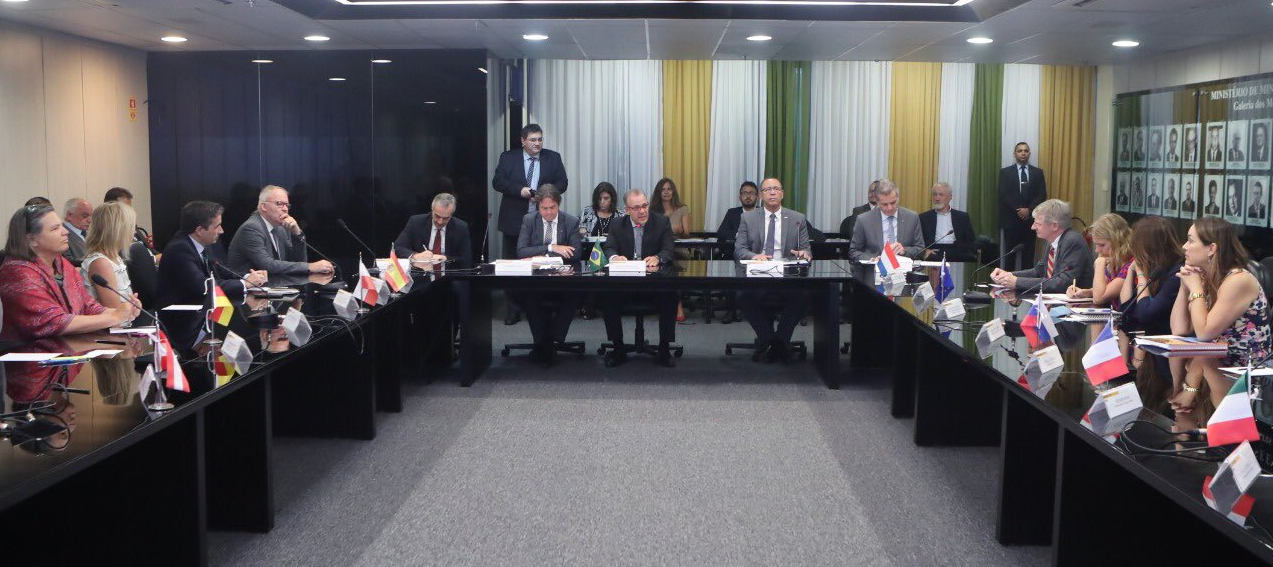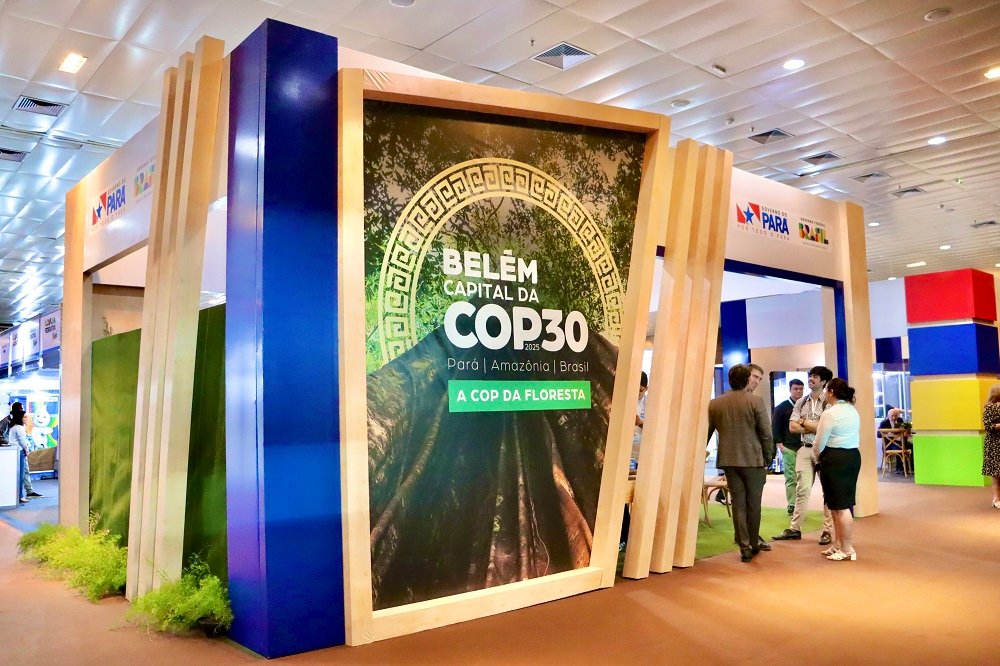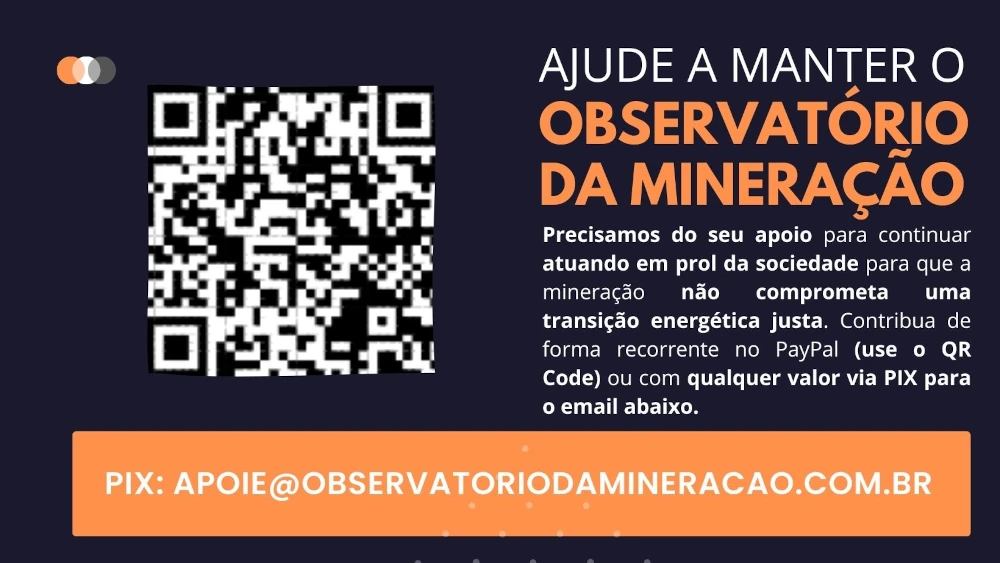Original story by Maurício Angelo, translated by: Gabriela Sarmet
Foreign ambassadors working in Brazil are frequently consulted by Jair Bolsonaro’s government on policies for the mineral sector and have an active voice in the joint strategy to free up indigenous lands for mining and garimpo.
This is what analyses based on 2021 and 2020 meeting agendas and announcements by the Ministry of Mines and Energy (MME) reveal. Among the ambassadors most heard are representatives of the United States, Canada, England and Australia, countries where mining companies have great economic and political strength. The European Union was also consulted.
In Brazil, companies from these countries are spread from north to south and are prominent in the mining sector, such as Anglo-Australian BHP, partner of Vale in Samarco, responsible for the Mariana disaster, the British Anglo American, which extracts iron ore in Minas Gerais and wants to explore indigenous lands in the Amazon, the Canadian Kinross, which operates a huge dam in Minas Gerais, Equinox Gold, responsible for contamination in Maranhão, Belo Sun, that insists on exploiting gold in the Amazon and the US company Mosaic Fertilizantes, to name just a few.
The meetings and seminars held by the MME summit show a real mineral fair, with the deliberate goal of attracting investments, exploring new areas, signing partnerships, simplifying processes and consulting with ambassadors and representatives of mining companies, who attend these meetings, about how public policies should be carried out.
Essentially part of this strategy is the “Mining and Development Programme” (PMD), launched at the end of 2020 and the PL 191/20, by Bolsonaro, Bento Albuquerque, of MME and Sérgio Moro, former Minister of Justice, who sign the project.
As revealed here at the Observatory in December 2020, the final 110 targets for the entire Brazilian extractive sector, which must be implemented by 2023, were literally dictated by the mineral sector and associations representing the sector.
In the analysis of internal documents shown exclusively, there was the target of having 8 indigenous lands available for mineral exploitation within 4 years, which was suggested by the Brazilian Association of Mineral Research Companies (ABPM) and accepted by the government.
The ABPM also asked for R$ 200 million in tax incentives for the prospecting of new areas. The PMD, in effect, is the motto of the main meetings before the official announcement of the program and after its publication.
The MME is touring with ambassadors from several countries to put into practice the PMD, which occupies the centre of Brazilian mineral policy at the moment.
European Union invited to explore indigenous lands
In January 2020, a month before signing PL 191/2020, Bento Albuquerque made more than clear the Bolsonaro government’s goals for mining on indigenous lands and invited several European countries to join the discussion.
The MME minister reinforced that the issue is extremely important for the Bolsonaro government, detailed the mineral wealth existing on indigenous lands and said that the exploitation of these areas was “an option made by the Brazilian people” as it is foreseen in the 1988 Constitution, awaiting deliberation by Congress – the reason for the bill he would sign soon afterwards.
Among those present, were diplomatic representatives from France, Sweden, Germany, Spain, Portugal, Italy, Poland, Belgium, Denmark, Slovenia, Czech Republic, Hungary, the Netherlands, and also the European Union, which represents 27 countries on the European Continent.
In german: Ausländische Botschafter bei Freigabe von indigenem Land für den Bergbau beteiligt
And the Minister of Mines and Energy took the opportunity to repeat the speech that has been the keynote of the government, that “many indigenous leaders” are in favor of mining in their lands and have “demanded the government” that this should be approved.
Albuquerque only hid that the main indigenous organizations in Brazil, like APIB and COIAB, are categorically against mining and leaders of the main ethnic groups affected by mining, like Kayapó, Munduruku and Yanomami, have recently united efforts to reject these attacks.
Then Alexandre Vidigal stepped in and presented MME projects and programmes, with the steadfast purpose of expanding mineral exploration in Brazil. For Vidigal, 40% of Brazilian territory has “some barriers” that prevent the advance of mining, such as indigenous areas, Conservation Units and areas with caves.
The declared goal of the government and with which they work is clear: to eliminate all these barriers, to put an end to any “impediment”.
“On this issue there is a lot of misinformation, and it is important that the international community listens to what the government has to say and not get caught up in erroneous external information,” Vidigal said on the occasion, stating that the impression expressed by the European Union representatives at the end of the meeting “was extremely positive”.

Canada is a strategic partner and praised example
Relations with Canada, including the participation of Canadian ambassadors in key matters in Brazil, have been frequent. In recent years Brazil has sponsored, featured and sent delegations to the largest mining event in the world, held in Toronto, as detailed here. It is at this event, the PDAC, that many of these partnerships are signed and targets are outlined.
In March 2021, Alexandre Vidigal took part in the opening of the Brazilian market on the Toronto Stock Exchange (TSX), one of the world’s leading stock exchanges for mining companies. The president for South America of the TSX, Guillaume Légaré considers Brazil “the country of the present” for mining, with enormous “mining potential”.
The president of ABPM also attended the event, along with executives from mining companies and Brazil’s ambassador to Canada, Petro Borio. In 2020, the Brazilian Mining Institute (IBRAM), which represents the largest companies in the sector, signed a memorandum of understanding to attract Canadian investments. Today Brazil has 36 companies trading on the Toronto Stock Exchange, with 99 mining properties.
The Mining Association of Canada and the Canada-Brazil Chamber of Commerce also have close relations with the Brazilian government.
In french: Au Brésil, l’exploitation minière des terres autochtones est soutenue par des ambassadeurs étrangers
In a December 2020 news release, MME says that “in recognising the efforts adopted by the Brazilian government towards ensuring greater legal and regulatory certainty in the sector”, the ambassador of Canada, Jennifer May, the ambassador of Australia, Timothy Kane, and the British consul in Belo Horizonte, Lucas Brown, “stressed their countries’ interest in strengthening their partnership with Brazil and promoting greater participation of their companies in the national mineral sector”.
No less than 150 representatives of Brazilian, Canadian, Australian and British mining companies attended the series of seminars made by the Bolsonaro government.
At the 2020 PDAC, Vidigal, from MME, met with the director-general of the Canadian government’s Mining Research Centre, Magdi Habib and discussed each country’s priorities for the mineral sector, “with an emphasis on mining on indigenous lands”.
According to the note, 95% of Canadian mining is carried out on indigenous land and this would be “a reference of successful experience,” said Vidigal. Disasters such as the Mount Polley dam collapse in 2014, which affected indigenous people, contradict this statement.
According to the MME, there was an exchange of experiences regarding the issues of compensation and consultation with indigenous communities to carry out mining activities in these areas. Vidigal also met with the president of the Mining Association of Canada, Pierre Gratton.
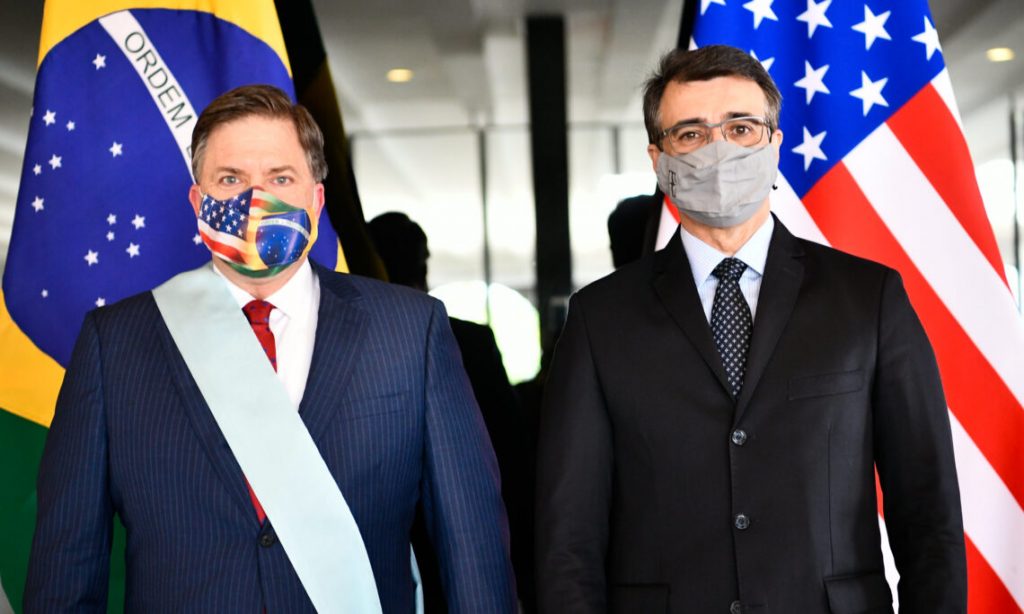
US ambassador “shared US experience” in mining on indigenous lands
Three months after Jair Bolsonaro sent PL 191/2020 to Congress in May 2020, MME’s Secretary of Geology and Mining (SGM), Alexandre Vidigal, attended a meeting with US Ambassador to Brazil, Todd Chapman.
Openly, the meeting dealt with “the purposes of the two countries regarding the paths and principles that should guide the development of the mineral sector“, with priority to “the advance of mining to new areas such as indigenous lands and border strips”.
Both goals were included in the PMD at the end of last year.
Chapman reinforced the willingness of the United States to share the American experience in the “development” of the Brazilian mineral sector, particularly regarding mining in indigenous areas, without forgetting the simplification of regulations.
The note points out that Chapman “praised the initiatives to facilitate business in Brazil and indicated the importance of disseminating these results to the private sector”.
In mining, Jair Bolsonaro and Joe Biden are aligned
Talks between Vidigal and US Ambassador Todd Chapman followed throughout 2020 and earlier this year. In March 2021, the Secretariat of Geology and Mining held a seminar with ambassadors from the United States and Ireland to attract investments within the PMD objectives.
Alexandre Vidigal stressed the Brazilian government’s “commitment to expanding mining”. In response, Todd Chapman, praised the “excellent timing of the US-Brazil bilateral relationship in mining”.
Here Joe Biden’s climate policies meet the greenwashing of mining. That green marketing make-up that portrays mining as essential to the world’s “energy transition”, ignoring the direct and indirect impacts caused by extractive activity.
Chapman highlighted that to meet US climate change targets, the production of minerals considered “critical” must rise by an incredible 500% and that a “Bilateral Working Group” on this issue has been set up with the Brazilian government following the 2020 talks.
“The Working Group aims to support the advancement of the diplomatic relationship and bilateral technical cooperation on strategic minerals, including improving the security of supply of these substances in both countries, promoting economically viable mining and production chains,” says the official announcement, from November.
If there are noises between Biden and Bolsonaro on deforestation of the Amazon and the targets announced by Brazil in the Paris Agreement, a setback, the case of mining is different. What exists is convergence and partnership.
The seminar included representatives of Mosaic Fertilizantes, who highlighted the “positive experience in investing” in Brazil. From a profit perspective, there is no doubt that Mosaic, one of the world’s largest fertiliser producers, has been experiencing boom times, recording net profits of $437 million in the second quarter of 2021 alone.
But the untold part is that, as we showed in the Observatory in 2019 and 2020, Mosaic operates some of the largest and most dangerous mining tailings dams in Brazil in Araxá (MG) and has evicted residents from their homes in Goiás to expand its project.
Technicians from the Geological Survey of Brazil (CPRM) and the National Mining Agency, at the same meeting, spoke about measures adopted by the agencies to simplify mining processes and identify new reserves in Brazil that are being put up for auction.
In July, Todd Chapman retired. The ambassador held the post in Brazil from March 2020 to July 2021. In his farewell letter, Chapman thanked the Bolsonaro government.
“Despite the pandemic, together we have been able to make concrete progress on initiatives that promote prosperity for Brazilians and US nationals. I would like to thank President Jair Bolsonaro, his ministers and all Brazilian government officials for their productive cooperation in advancing the Brazil-US partnership. I am optimistic about the future of Brazil and this relationship,” Chapman said.
Shortly before retiring, Chapman received from the Bolsonaro government the National Order of the Southern Cross, the highest Brazilian decoration awarded to foreign dignitaries.
Mining companies express support for policies conducted by Bolsonaro
A video conference held in July 2020 by Alexandre Vidigal, the most frequent figure behind these meetings – and who recently left his post at MME – is quite expressive in highlighting the massive support of mining companies for the policies of Jair Bolsonaro, the MME, ANM and other institutions.
It was attended by the UK ambassador at the time, Vijay Rangarajan – later replaced by Peter Wilson – and executives from major players in the sector, such as Anglo American, Horizonte Minerals, Appian Capital, Arcelor Mittal and Verde Agritech.
“The attending companies expressed the private sector’s support for the mining policy conducted by the Federal Government. They stressed the maintenance of their activities in the midst of the pandemic as an expression of their confidence in the contribution of mining to the sustainable economic growth of the countries,” the statement said.
It was precisely after a series of articles published by the Observatory at the beginning of the pandemic, in 2020, with pressure from mining companies and IBRAM, confirmed by the Institute to the Observatory, that the federal government published an administrative order making mining an essential activity in Brazil.
This was key to ensuring a 36% higher profit in 2020 compared to 2019. Last year, the largest mining companies operating in Brazil made a profit of R$ 209 billion reais. And the pace of cash on hand, driven by a new boom in commodities, continues to rise in 2021.
This profit was obtained at the expense of workers’ lives, subjected to non-stop shifts in the mines, as reported here. The pandemic has already killed almost 600,000 Brazilians. The stories and this drastic situation for mining company employees led to a denunciation that was accepted by the Inter-American Commission on Human Rights.
The virtual meeting, organized by the United Kingdom Consulate in Belo Horizonte and the Brazil-United Kingdom Chamber of Commerce (Bricham), in Minas Gerais, had as its theme precisely the “perspectives of the mining sector in the post-COVID period”.
Soon after, in August 2020 the PMD was formally presented to Vijay Rangarajan.
At the time, the British consul “praised the initiative, in particular the centrality given to the sustainability of mining, and anticipated his country’s interest in collaborating with Brazil on this topic, as well as on issues related to attracting investments, remote monitoring technologies and geological knowledge”.
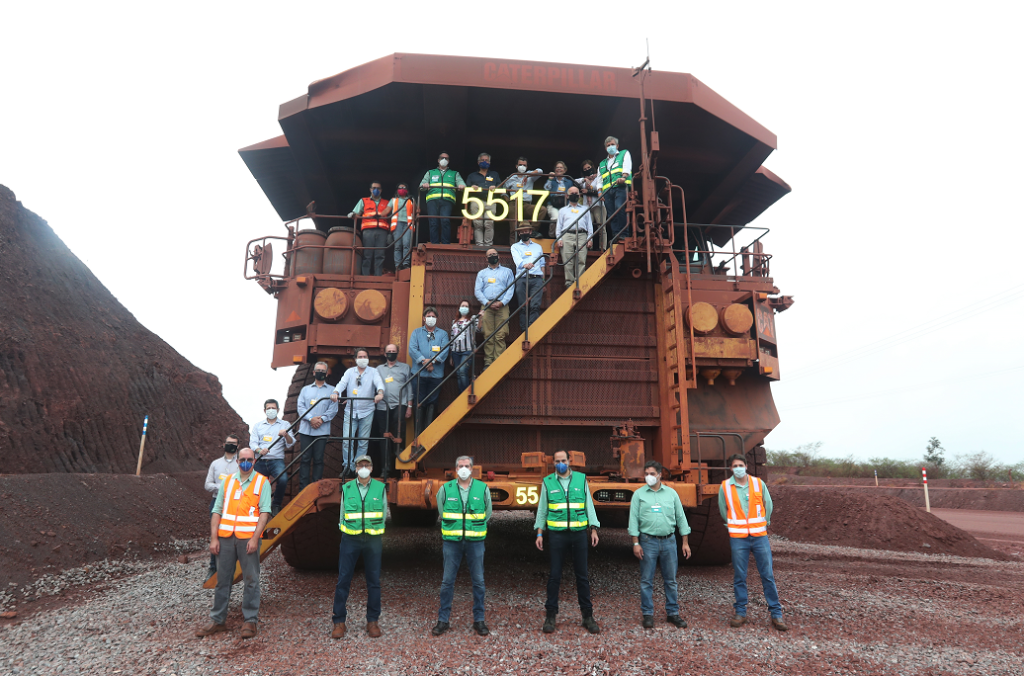
Bento Albuquerque and several ambassadors visited Vale’s Carajás mine
In September 2020, the Minister of Mines and Energy, Bento Albuquerque, and a delegation composed of ambassadors and diplomats from Austria, Belgium, Ireland, Luxembourg, Sweden and the European Union in Brazil visited Vale’s Carajás facilities in Pará.
According to the official statement, the trip served to “demystify” questions about mining and show Vale’s “sustainable performance”.
Centre of the largest iron ore project in the world, the S11D, the area, located between Parauapebas, Marabá and Canaã dos Carajás, is part of an immense mineral complex which also produces kaolin, bauxite, manganese, copper and gold.
The production system includes mine, plant, railroad and port logistics. There are almost 1000 kilometres of railway from Pará to Maranhão. Along the way, rural producers attacked by Vale security guards, indigenous lands, quilombolas and communities that suffer 24 hours a day the impacts of the railway in their lives.
“The visit was very fruitful, as we were able to see issues related to sustainable mining and also served to demystify some aspects of mining in the Amazon region for the ambassadors, diplomats and prosecutors,” said Albuquerque.
Pará already has 1,838 active mining permits for mining activities. The expectation is that this number will grow exponentially over the next few years.
We contacted the embassies of the United States, Canada, United Kingdom and Australia to comment on the content of these meetings, the PMD and PL 191/2020. The Australian Embassy said it would not be able to respond in time. Even with more time, it did not return either. The other three had not replied as of the publication of this text.
First published in portuguese on September 13th
Descubra mais sobre Observatório da Mineração
Assine para receber nossas notícias mais recentes por e-mail.
